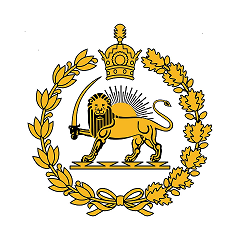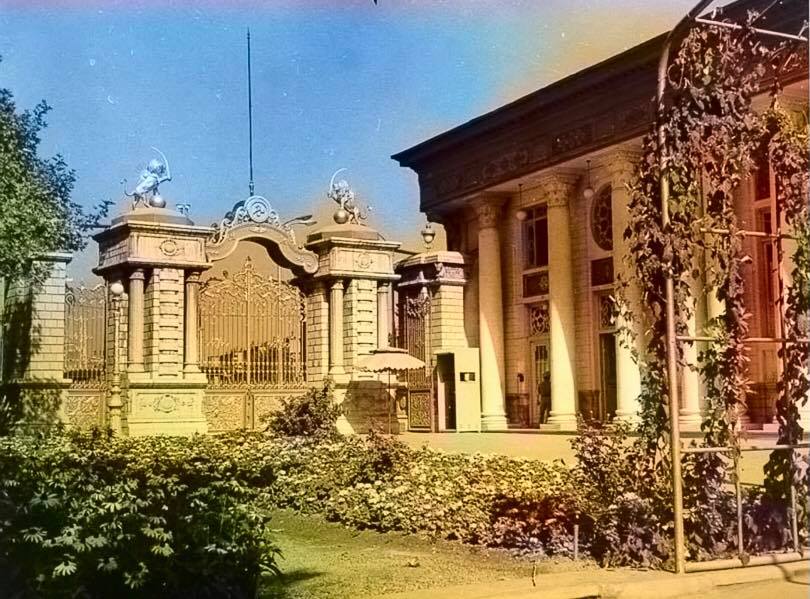
 | International House of Mashruteh |

ART. 15. The National Consultative Assembly has the right in all questions to propose any measure which it regards as conducive to the well-being of the Government and the People, after due discussion and deliberation thereof in all sincerity and truth; and, having due regard to the majority of votes, to submit such measure, in complete confidence and security, after it has received the approval of the Senate, by means of the First Minister of the State, so that it may receive the Royal Approval and be duly carried out.
ART. 16. All laws necessary to strengthen the foundations of the State and Throne and to set in order the affairs of the Realm and the establishment of the Ministries, must be submitted for approval to the National Consultative Assembly.
ART. 17. The National Consultative Assembly shall, when occasion arises, bring forward such measures as shall be necessary for the creation, modification, completion or abrogation of any Law, and, subject to the approval of the Senate, shall submit it for the Royal Sanction, so that due effect may thereafter be given to it.
ART. 18. The regulation of all financial matters, the construction and regulation of the Budget, all changes in fiscal arrangements, the acceptance or rejection of all incidental and subordinate expenditure, as also the new Inspectorships [of Finance] which will be founded by the Government, shall be subject to the approval of the Assembly.
ART. 19. The Assembly has the right, after the Senate has given its approval, to demand from the Ministers of State that effect shall be given to the measures thus approved for the reform of the finances and the facilitation of co-operation between the different departments of the Government by division of the departments and provinces of Persia and their governments.
ART. 20. The Budget of each Ministry shall be concluded during the latter half of each year for the following year, and shall be ready fifteen days before the Festival of the Nawrúz 1.
ART. 21. Should it at any time be necessary to introduce, modify or abrogate any Fundamental Law regulating the [functions of the] Ministries, such change shall be made only with the approval of the Assembly, irrespective of whether the necessity for such action has been declared by the Assembly or enunciated by the responsible Ministers.
ART. 22. Any proposal to transfer or sell any portion of the [National] resources, or of the control exercised by the Government or the Throne, or to effect any change in the boundaries and frontiers of the Kingdom, shall be subject to the approval of the National Consultative Assembly.
ART. 23. Without the approval of the National Council, no concession for the formation of any public Company of any sort shall, under any plea so ever, be granted by the State.
ART. 24. The conclusion of treaties and covenants, the granting of commercial, industrial, agricultural and other concessions, irrespective of whether they be to Persian or foreign subjects, shall be subject to the approval of the National Consultative Assembly, with the exception of treaties which, for reasons of State and the public advantage, must be kept secret.
ART. 25. State loans, under whatever title, whether internal or external, must be contracted only with the cognizance and approval of the National Consultative Assembly.
ART. 26. The construction of railroads or chaussées, at the expense of the Government, or of any Company, whether Persian or foreign, depends on the approval of the National Consultative Assembly.
ART. 27. Wherever the Assembly observes any defect in the laws, or any neglect in giving effect to them, it shall notify the same to the Minister responsible for that department, who shall furnish all necessary explanations.
ART. 28. Should any Minister, acting under misapprehension, issue on the Royal Authority, whether in writing or by word of mouth, orders conflicting with one of the laws which have been enacted and have received the Royal Sanction, he shall admit his negligence and lack of attention, and shall, according to the Law, be personally responsible to His Imperial and Most Sacred Majesty.
ART. 29. Should a Minister fail to give a satisfactory account of any affair conformably to the laws which have received the Royal Sanction, and should it appear in his case that a violation of such law has been committed, or that he has transgressed the limits imposed [on him], the Assembly shall demand his dismissal from the Royal Presence, and should his treason be clearly established in the Court of Cassation, he shall not again be employed in the service of the State.
ART. 30. The Assembly shall, at any time when it considers it necessary, have the right to make direct representations to the Royal Presence by means of a Committee consisting of the President and six of its Members chosen by the Six Classes. This Committee must ask permission, and the appointment of a time for approaching the Royal Presence through the Master of the Ceremonies (Wazír-i-Darbár).
ART. 31. Ministers have the right to be present at the Sessions of the National Consultative Assembly, to sit in the places appointed for them, and to listen to the debates of the Assembly. If they consider it necessary, they may ask the President of the Assembly for permission to speak, and may give such explanations as may be necessary for purposes of discussion and investigation.
On the representation of affairs to the National Consultative Assembly.
ART. 32. Any individual may submit in writing to the Petition Department of the Archives of the Assembly a statement of his own case, or of any criticisms or complaints. If the matter concerns the Assembly itself, it will give him a satisfactory answer; but if it concerns one of the Ministries, it will refer it to that Ministry, which will enquire into the matter and return a sufficient answer.
ART. 33. New laws which are needed shall be drafted and revised in the Ministries which are respectively responsible, and shall then be laid before the Assembly by the responsible Ministers, or by the Prime Minister. After being approved by the Assembly, and ratified by the Royal Signature, they shall be duly put into force.
ART. 34. The President of the Assembly can, in case of necessity, either personally, or on the demand of ten Members of the Assembly, hold a private conference, consisting of a selected number of Members of the Assembly, with any Minister, from which private meeting newspaper correspondents and spectators shall be excluded, and at which other Members of the Assembly shall not have the right to be present. The result of the deliberations of such secret conference shall, however, only be confirmed when it has been deliberated in the said conference in presence of three quarters of those selected [to serve on it], and carried by a majority of votes. Should the proposition [in question] not be accepted in the private conference, it shall not be brought forward in the Assembly, but shall be passed over in silence.
ART. 35. If such private conference shall have been held at the demand of the President of the Assembly, he has the right to inform the public of so much of the deliberations as he shall deem expedient; but if the private conference has been held at the demand of a Minister, the disclosure of the deliberations depends on the permission of that Minister.
ART. 36. Any Minister can withdraw any matter which he has proposed to the Assembly at any point in the discussion, unless his statement has been made at the instance of the Assembly, in which case the withdrawal of the matter depends on the consent of the Assembly.
ART. 37. If a measure introduced by any Minister is not accepted by the Assembly, it shall be returned supplemented by the observations of the Assembly; and the responsible Minister, after rejecting or accepting the criticisms of the Assembly, can propose the aforesaid measure a second time to the Assembly.
ART. 38. The Members of the National Consultative Assembly must clearly and plainly signify their rejection or acceptance of measures, and no one has the right to persuade or threaten them in recording their votes. The signification by the Members of the Assembly of such rejection or acceptance must be effected in such manner that newspaper correspondents and spectators also may perceive it, that is to say their intention must be signified by some outward sign such as [the employment of] blue and white voting-papers, or the like.